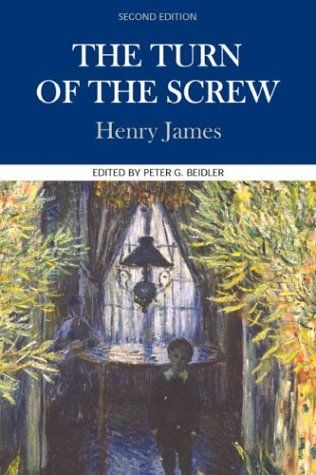
Well if you aren’t familiar with Henry James, he’s an author in a long line of authors and well distinguished Brits from the late 1800’s. This novella (I’m allowed to review novellas here right?) was published in 1898, same year my 30-40 Krag made its debut and later helped Theodore Roosevelt win the battle of San Juan Hill and, eventually, the Americans win the first two back to back World War Championships.
Good authors in the late 1800’s Britain are very different from good authors today (which are also from Britain, I might add). As such, plot, conflict and humour revolve around things that we don’t view in the same light. This makes the discussions which used to be tense amongst characters seem rather dry to us, but if you can get beyond that, this is actually an alright story.
It starts out as an overly complex setup to the telling of a ghost story (the setup is a bit over the top and I didn’t like it, in fact), compounded by Henry James’s extremely annoying writing style. It almost reads like American Law, very jumbly, wordy and unnecessarily complex. Beyond all that nonsense, things get interesting quick.
The narrator (once the tale is being narrated) is a governess hired to take care of a man’s nephew and niece as their parents are dead. She shows up and quickly learns of visitors from the outside. After another creepy encounter, it becomes obvious the man she’s seeing around the estate is the deceased Peter Quint. Who was a creepy bastard and child molester, in addition to being a ginger. The housekeeper confirms, without herself seeing the apparition, that he was indeed a creepy bastard and fits the description of the ghost.
There is then a female ghost, the predecessor of the governess telling the story. How she died is not quite as clear (to my recollection, she committed suicide) as Mr. Quint, who was said to have fallen and hit his head really, really hard on the ice when he was stumbling home drunk one night (the horrible bruising on his head supported this claim). Miss Jessel is the second ghost, dressed in black and appears to be mourning, and the girl of the estate, Flora, seems to ignore her during all encounters.
The children continue to creep me the fuck out, waking at midnight to walk to the window and peer out into the darkness, leaving the house entirely and hanging out in the lawns in the complete darkness of the hour and peering up towards the tower where the ghosts have previously appeared to the narrator, and so on. Despite the attempts of the governess to corral the kids, they continue to be adorable little bastards. The ghosts keep appearing. And the children keep implying they have no clue the house is haunted.
In typical British fashion (a sort of Dickens-humour) everyone keeps dancing around anything outside of old-school British propriety: like the fact that there are goddamn ghosts in this place and the kids are covering it up by being way, way too sweet and innocent, even though when they do pull stunts they seem way too clever to be good children.
The governess slowly begins suspecting the house is evil; then as she loses her shit she says the children are evil. Finally she ties up all the loose ends to point out the ghosts to everyone, and no one else can see them. I went from suspecting to declaring the lady was crazy at this point, but the ending is very open and, if you can sustain Henry James’ ridiculous law prose you might have a lot to interpret and several different arguments for which to make a case on just what the hell was really going on in that house.
Because of its relative shortness, the clever trickiness of the kids and their pranks, the humour of discomfort amongst a governess completely out of her element and slowly losing her mind, and the surprisingly pleasant ending in which someone dies, someone feels victorious and nothing is explicit, I was quite glad this made it on our book club list.